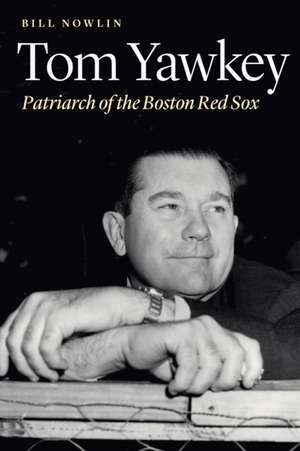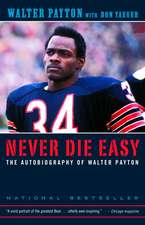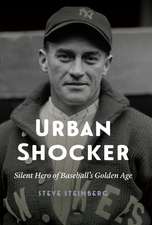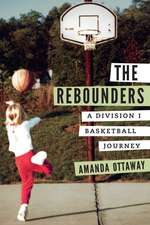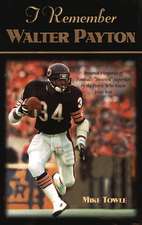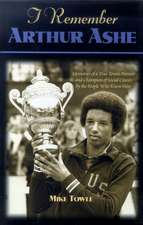Tom Yawkey: Patriarch of the Boston Red Sox
Autor Bill Nowlinen Limba Engleză Hardback – 31 ian 2018
2019 SABR Baseball Research Award
Few people have influenced a team as much as did Tom Yawkey (1903–76) as owner of the Boston Red Sox. After purchasing the Red Sox for $1.2 million in 1932, Yawkey poured millions into building a better team and making the franchise relevant again.
Although the Red Sox never won a World Series under Yawkey’s ownership, there were still many highlights. Lefty Grove won his three hundredth game; Jimmie Foxx hit fifty home runs; Ted Williams batted .406 in 1941, and both Williams and Carl Yastrzemski won Triple Crowns. Yawkey was viewed by fans as a genial autocrat who ran his ball club like a hobby more than a business and who spoiled his players. He was perhaps too trusting, relying on flawed cronies rather than the most competent executives to run his ballclub. One of his more unfortunate legacies was the accusation that he was a racist, since the Red Sox were the last Major League team to integrate, and his inaction in this regard haunted both him and the team for decades. As one of the last great patriarchal owners in baseball, he was the first person elected to the Baseball Hall of Fame who hadn’t been a player, manager, or general manager.
Bill Nowlin takes a close look at Yawkey’s life as a sportsman and as one of the leading philanthropists in New England and South Carolina. He also addresses Yawkey’s leadership style and issues of racism during his tenure with the Red Sox.
Few people have influenced a team as much as did Tom Yawkey (1903–76) as owner of the Boston Red Sox. After purchasing the Red Sox for $1.2 million in 1932, Yawkey poured millions into building a better team and making the franchise relevant again.
Although the Red Sox never won a World Series under Yawkey’s ownership, there were still many highlights. Lefty Grove won his three hundredth game; Jimmie Foxx hit fifty home runs; Ted Williams batted .406 in 1941, and both Williams and Carl Yastrzemski won Triple Crowns. Yawkey was viewed by fans as a genial autocrat who ran his ball club like a hobby more than a business and who spoiled his players. He was perhaps too trusting, relying on flawed cronies rather than the most competent executives to run his ballclub. One of his more unfortunate legacies was the accusation that he was a racist, since the Red Sox were the last Major League team to integrate, and his inaction in this regard haunted both him and the team for decades. As one of the last great patriarchal owners in baseball, he was the first person elected to the Baseball Hall of Fame who hadn’t been a player, manager, or general manager.
Bill Nowlin takes a close look at Yawkey’s life as a sportsman and as one of the leading philanthropists in New England and South Carolina. He also addresses Yawkey’s leadership style and issues of racism during his tenure with the Red Sox.
Preț: 233.60 lei
Nou
Puncte Express: 350
Preț estimativ în valută:
44.70€ • 48.54$ • 37.55£
44.70€ • 48.54$ • 37.55£
Carte disponibilă
Livrare economică 01-15 aprilie
Preluare comenzi: 021 569.72.76
Specificații
ISBN-13: 9780803296831
ISBN-10: 0803296835
Pagini: 560
Ilustrații: 28 photographs, index
Dimensiuni: 152 x 229 x 46 mm
Greutate: 0.96 kg
Editura: Nebraska
Colecția University of Nebraska Press
Locul publicării:United States
ISBN-10: 0803296835
Pagini: 560
Ilustrații: 28 photographs, index
Dimensiuni: 152 x 229 x 46 mm
Greutate: 0.96 kg
Editura: Nebraska
Colecția University of Nebraska Press
Locul publicării:United States
Notă biografică
Bill Nowlin has been the vice president of the Society for American Baseball Research since 2004 and is one of the co-founders of Rounder Records. He has written more than thirty-five Red Sox–related books, including Ted Williams at War and The SABR Book of Umpires and Umpiring, and is the coeditor of Drama and Pride in the Gateway City: The 1964 St. Louis Cardinals (Nebraska, 2013).
Cuprins
Introduction
1. A Baseball Santa, Tom Yawkey in 1933
2. Tom Yawkey and Eddie Collins Buy the Red Sox
3. The First Season
4. The First Offseason
5. Tom Yawkey’s Past
6. Yawkey at Yale
7. The First Full Season of the Yawkey Era, 1934
8. 1935–1938
9. The Kid Makes the Big Leagues, 1939
10. Before the War, 1940–1941
11. The War Years, 1942–1945
12. Postwar and the Pennant, 1946
13. Strong Seasons, 1947–1950
14. The Early 1950s
15. Doldrums Descend, the Latter 1950s
16. From Ted to Yaz, the First Sox Seasons of the 1960s
17. The Impossible Dream
18. After the Dream
19. Another Game Seven
20. Tom Yawkey’s Final Campaign
21. Jean Yawkey in the Late 1970s
22. Tom Yawkey Remembered and the Jean Yawkey Years, 1980–1985
23. The 1986 World Series and the Years That Followed
24. The Passing of Jean Yawkey
25. The Estate, 1994, and Beyond
26. The Yawkey Legacy
27. Tom Yawkey and Race
Epilogue
Acknowledgments
Notes
Index
1. A Baseball Santa, Tom Yawkey in 1933
2. Tom Yawkey and Eddie Collins Buy the Red Sox
3. The First Season
4. The First Offseason
5. Tom Yawkey’s Past
6. Yawkey at Yale
7. The First Full Season of the Yawkey Era, 1934
8. 1935–1938
9. The Kid Makes the Big Leagues, 1939
10. Before the War, 1940–1941
11. The War Years, 1942–1945
12. Postwar and the Pennant, 1946
13. Strong Seasons, 1947–1950
14. The Early 1950s
15. Doldrums Descend, the Latter 1950s
16. From Ted to Yaz, the First Sox Seasons of the 1960s
17. The Impossible Dream
18. After the Dream
19. Another Game Seven
20. Tom Yawkey’s Final Campaign
21. Jean Yawkey in the Late 1970s
22. Tom Yawkey Remembered and the Jean Yawkey Years, 1980–1985
23. The 1986 World Series and the Years That Followed
24. The Passing of Jean Yawkey
25. The Estate, 1994, and Beyond
26. The Yawkey Legacy
27. Tom Yawkey and Race
Epilogue
Acknowledgments
Notes
Index
Recenzii
"Immaculately researched, well-written."—Wall Street Journal
"Nowlin . . . has written a well-researched biography about the fascinating journey of the Red Sox during the Yawkey era. Although the team never won a World Series under Yawkey's stewardship, he was able to produce players such as Jimmie Foxx, Ted Williams, and Carl Yastrzemski. Nowlin touches on all aspects of Yawkey's life as a philanthropist as well as an aggressive deal-maker, even with regard to controversial issues. This is the most in-depth book written about Yawkey; Red Sox and baseball history fans will appreciate it."—Gus Palas, Library Journal
"A wonderful portrait of Yawkey, who was so shaped both by the time and place he came of age in, and crippled by them, too."—Bill Reynolds, Providence Journal
"Tom Yawkey allows the reader to be immersed in baseball's atmosphere during the Yawkey era."—Ron Slate, On the Seawall
"An excellent source of information for both the man and his team."—Lance Smith, Guy Who Reviews Sports Books
"Bill Nowlin does an incredible job of going into the complex figure that was Tom Yawkey, making this biography a must-read when it comes to understanding the history of the Boston Red Sox."—Jason Schott, brooklynfans.com
“Tom Yawkey loved baseball. He played pepper at Fenway Park, he ordered the walls cushioned when Fred Lynn lay on the ground in the 1975 World Series, and when Dick O’Connell and John Harrington went to his bedside in ’76 to tell him they’d bought Rollie Fingers and Joe Rudi, he replied, ‘Why didn’t you get Bando?’ Had he been more dictator than kind, he’d have won the ring that eluded him.”—Peter Gammons, sportswriter, media personality, and winner of the J. G. Taylor Spink Award for outstanding baseball writing from the Baseball Writers Association of America
“Tom Yawkey was arguably the most important, and least understood, figure in the long history of the Red Sox, and Bill Nowlin is the team’s most passionate and dedicated chronicler. Yawkey needed a book like this, and we are most fortunate that Bill was the guy who wrote it.”—Mark Armour, author of Joe Cronin: A Life in Baseball
